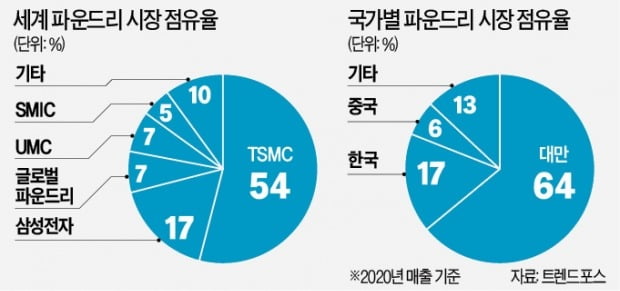TSMC of Taiwan, the world’s No. 1 foundry (consignment production of semiconductors), is promoting the construction of R&D facilities in Japan. Amid the continuing global shortage of semiconductors, analysis shows that TSMC has stepped up to solidify the global market leader in cooperation with Japan after the US.

Japan intensively fosters semiconductors
The Nippon Geizai Shimbun reported on the 9th that TSMC is coordinating a plan to build the first research institute in Japan in Tsukuba, Irabaki Prefecture. TSMC plans to establish a new company in Japan and invest about 20 billion yen (about 2124 billion won) for this purpose.
The Nihon Keizai Shimbun reported that the technology development for the semiconductor post-process is being intensively carried out here and the installation of the production line is being reviewed. The semiconductor manufacturing process is divided into a wafer process (pre-process) and a package process (post-process). The wafer process is the process of making transistors and metal wires on a silicon substrate. In the package process, the wafer is cut into pieces, connected to other substrates, and covered with organic materials to protect. The most up-to-date technology is required for the front process, but the importance of the post process is increasing recently.
The Japanese Ministry of Economy, Trade and Industry sees semiconductors as a strategic industry. Accordingly, it is known to support cooperation between TSMC and Japanese companies through subsidies. Earlier, Japanese semiconductor company Renesas Electronics also announced that it had agreed to purchase Dialog Semiconductor, a British company the day before. The purchase amount is 6179 billion yen (about 6,562.3 billion won). Through this acquisition, Renesas plans to intensively foster the automotive semiconductor sector and the fifth generation (5G) mobile communication sector, which are the core sectors of its existing business.
TSMC is also rapidly increasing its US investment. After stopping transactions with Huawei, a Chinese communication equipment company, due to US sanctions in China, it began strengthening cooperation with the US semiconductor industry. TSMC plans to invest up to 28 billion dollars (about 31 trillion won) this year alone, including building the first semiconductor plant in the US.
Europe “Semiconductor Self-Sufficiency”
Competition among countries around the world to increase semiconductor competitiveness is getting fiercer. Europe is pushing ahead with a plan to invest up to 50 billion euros (about 6.7 trillion won) in the semiconductor industry.
According to the leading German daily newspaper Frankfurter Algemaine Chaitung (FAZ), European governments are planning to support 20-40% of the amount that companies invest in the semiconductor industry through subsidies. German Minister of Economy and Energy Peter Altmeier said last week, “The investment in the European semiconductor industry will reach a maximum of about 50 billion euros.” “It exceeds the annual sales of European semiconductor companies.”
In Europe, there is a growing voice that the dependence on Asian semiconductor companies should be reduced. This is because the European auto industry, such as Volkswagen, Mercedes-Benz, and BMW, suffered measles due to the lack of supply of semiconductors for vehicles. Earlier, European semiconductor companies called for full support to the European Union (EU) authorities, saying, “Competitors in Asia and the United States have a clear advantage in the competition thanks to massive subsidies from their own governments.”
In this regard, 19 EU countries agreed to introduce a multi-billion-euro support program for the development of the semiconductor industry in December last year. The idea is to preserve the semiconductor industry in Europe and enable independent semiconductor supply within Europe. Germany, France, Italy, Spain, and the Netherlands participate in the program.
Infineon, a German system semiconductor company, stressed, “What’s important now is the fast and consistent advancement of the EU Commission.”
Reporter Park Sang-yong [email protected]
